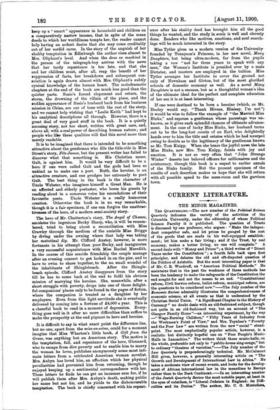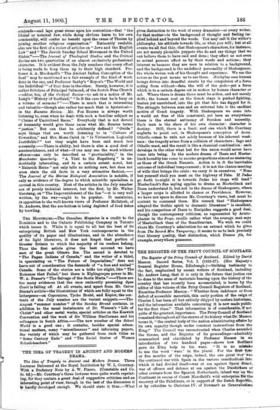C URRENT LITERATURE.
THE MINOR MAGAZINES.
THE QuaurEntaxs.—The new number of the Political Science Quarterly indicates the variety of the activities of the Columbia University, under the editorship of whose Political Science Faculty it is published. The question of Trusts is discussed by one professor, who argues : "Make the indepen- dent competitor safe, and let prices be gauged by the cost of the goods that are made in his well-equipped establish - ment ; let him make a fair living ; and if the Trust, by real economy, makes a better living, no one will complain." A second deals with "Money and Prices"; a third writes of "Direct Taxes under the Constitution " ; a fourth falls back upon first principles, and debates the old and oft-disputed question of the Politics of Aristotle. But the most interesting paper is that of Mr. C. E. Woodruff, on "American Political Methods." He maintains that in the past the weakness of these methods has been the tendency to make the safeguards of the Constitution the end sought for and not the means to an end. "Constitutional reform, Civil Service reform, ballot reform, municipal reform, are the questions to be considered now."—The july number of the Economic Review admirably illustrates the comprehensiveness of economic science, at all events as that is understood by the Christian Social Union. "A Significant Chapter in the History of Currency" no doubt deals with an old-fashioned subject, though not quite in an old-fashioned way, but an account of "The Glasgow Family Home "—an interesting experiment, by the way —" Wage-Earning Children," "Fifty Years of Industry from the Workman's Point of View," and Mrs. Toynbee's "Poverty and the Poor Law" are written from the new " social " stand- point. The most emphatically popular article, however, is a realistic but distinctly hopeful one on "Poor People's Music. Halls in Lancashire." The writers think these music-halls, on the whole, preferable not only to "public-house sing-songs," but to ordinary "theatres of varieties."—The July number of the Law Quarterly is preponderatingly technical. Mr. McCalmont Hill gives, however, a generally interesting article on "The Growth and Development of International Law in Africa." He
takes a moderate view of recent events, and looks for the develop-
ment of African international law in the meantime to Europe rather than to the Dark Continent.—In an interesting number of the Jewish Quarterly Review the most notable paper, at least in the eyes of outsiders, is "Liberal Judaism in England : its Diffi- culties and its Duties." The author, Mr. C. G. Montefiore, contends—and lays great stress upon his contention—that "the liberal or nominal Jew, while doing obvious harm to his own comm,unity, will confer no benefit upon the cause of Theism by joining another religious organisation." Eminently readable also are the first of a series of articles on "Jews and the English Law" and" The Jewish Sunday School Movement in the United States."—The Journal of Theological Studies and the Critical Review are two quarterlies of an almost exclusively professional character. It is evident from the July numbers that every effort is being made to keep them up to their high standard. Pro- feseor A. A. Macdonell's "The Ancient Indian Conception of the Soul" may be mentioned as a fair example of the kind of work done in the one, and Professor Saxby's "Royce's The World and the Individual '" of that done in the other. Surely, however, it is rather frivolous of Principal Salmond, of the Scotch Free Church —editor, too, of the Critical Review—to ask in a notice of Mr. Lang's "History of Scotland," "Is it the case that he is busy on a volume of sermons ? "—There is much that is interesting and valuable—though also rather too much that is hysterical— in the Humane Review. Mr. Fox Bourne is always worth listening to, even when he deals with such a familiar subject as "Claims of Uncivilised Races." Everybody that is not devoid of humanity would give these races what Mr. Bourne terms "justice." But can that be arbitrarily defined ? "Onida " says things that are worth listening to in "Culture of Cowardice," and Mrs. Mona Caird in "Is Vivisection Logically Justifiable ?" but they might have been said much less e.creamily.--There is ability, but there is also a good deal of amateurishness, and of what—if one may use the word without offence—.can only be described as "provinciality," in the Manchester Quarterly. "A Visit to the Engelberg " is un- doubtedly interesting, and to a certain extent novel, but "Heinrich Heine" not only tells us nothing new, but does not even state the old facts in a very attractive fashion.— The Journal of the Marine Biological Association is notable, if only as evidence of the degree to which scientific specialism is carried in this country. Most of the articles in the July number are of purely technical interest, but the first, by Mr. Walter Garstang, on " The Impoverishment of the Sea "--it is very well written, by the way—ought to be popular. It maintains, in opposition to the well-known views of Professor McIntosh, of St. Andrews, that the sea-bottom is being depleted of food fishes by trawling.



































 Previous page
Previous page